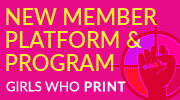
Image Source (Note: image modified to include text)
The other day I read an article on Fast Company about Chris Sacca, one of the biggest Twitter investors since the company went public. The article (“Why Hustling Helps People Become Insanely Successful“) explains how the young Sacca felt snubbed by potential employers because his personal business cards didn’t seem impressive enough. So he made up a fake company, complete with a phony website and logo, to serve as the props for the main event: new business cards that listed him as principal of the fictions corporation.
Suddenly, Sacca’s luck changed. When he passed out the new cards at networking events, the recipients expressed interest in working with him. Eventually he landed a lucrative executive position through one of his new contacts. And now he’s a well-known, highly successful entrepreneur.
A Question of Ethics
Now I’m personally very disappointed in Fast Company for running this article. I think Sacca’s actions should be condemned, not praised. The title also strikes me as boarding on link bait (intentionally misleading, how appropriate!) because the article doesn’t fulfill its promise. It explains how a single person i.e. not “people” misrepresented himself , but I digress. The article sparked a lively discussion in several professional groups I belong to, with mixed opinions as to whether or not Sacca lied to get ahead. I thought the article made it pretty clear that Sacca never intended to serve as a consultant, but I can’t say for sure without knowing the all the facts. Nevertheless, my friend and fellow PMC blogger Sandy Hubbard shared her insight in a Google Plus discussion that I deemed quote worthy:
“We’re overlooking the fact that a printed business card still conveys credibility. Whether deceitful or not, Sacca knew that print would open doors for him.”
Sandy’s point opened my eyes to see the story from a new perspective. According to the article, Sacca decided to invent the fake consultancy out of fear that his personal business cards, “weren’t going to capture anyone’s attention.” His solution to the problem also revolves around print because he created new cards along with the rest of his phony corporate identity. So in a sense, Sacca understood that print equates to legitimacy in professional circles and used this to his advantage. His website simply covered his ass in case anyone in the offline world tried to check him out online.
Don’t Deceive, Design!
The article doesn’t say when the story takes place, although it’s safe to assume that Sacca graduated from law school a while ago. I seriously doubt that he regrets his indiscretions; otherwise, that would have been a completely different article. I think he could have gotten similar results without a inventing a fancy job title, though. Those of us in the print community are no strangers to wanting business cards that stand out, except we achieve this goal through design instead of deceit. I can think of about a hundred graphic as well as tactile solutions that would have gotten him the attention he craved. Yet by presenting himself as a freelance consultant with unique custom cards, he could’ve held onto the most important thing you can have in the business world: integrity.
Katherine serves as the Online Marketing Director at PrintFirm.com. She fell into online marketing in 2010, and built her career around this dynamic field. She earned her B.A. in Political Science from California State University, Northridge (Summa). When she’s not writing, Katherine enjoys photography, skateboarding, graphic design, and chasing her dog around with her husband.
Connect with Katherine on Facebook G+ and LinkedIn – and follow @PrintFirm on Twitter












3 Responses
This post judges a person for using a common credibility building trick while in reality it is nothing more than a badly disguised sales pitch for buying business cards.
EricBenndorf This site is dedicated to print and marketing, so yeah, the promotion of print as a communications tool, in this case through business cards, is what we do. However, categorizing this post as a sales pitch goes a bit far. Oh, and Im pretty sure passing yourself off as a CEO of a nonexistent company to establish credibility is called FRAUD in many circles.
EricBenndorf Hello and thanks for your feedback! I think it’s interesting that you used the word “trick” because that implies deliberate deceit. In essence your criticism reaffirms my point.